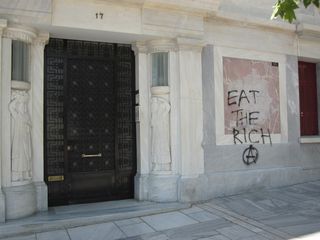Mary Beard's Blog, page 64
August 1, 2011
From El Bulli to Apicius
I found myself decidedly unmoved by this weekend's obituaries of El Bulli ('the best restaurant in the world'). A friend of mine did make the gastronomic pilgrimage a decade or so ago, and came back full of stories of its brilliance. He had been especially impressed with the way the waiters had held appropriately scented flowers under their noses as the ate particular dishes. My reaction was not 'what brilliant attention to synaesthesia', but 'how bloody pretentious can you get?'.
Try some of his specialities (like the 'soup' above): liquid pea ravioli (that's ravioli shells, filled with pea soup) or flower paper (that's flowers pressed into a sheet of candy floss) or the ball of frozen gorgonzola. All this brings out the culinary philistine in me, or the 'Arts and Crafts, Truth to Materials' approach to cooking. (If God had wanted flowers pressed into a sheet of candy floss . . . etc etc. Or why bother to freeze good gorgonzola?)
The husband is with me on this one, but for slightly different reasons. He hates the control exercised by these celebrity cooks; the 'eat what I deign to give you' philosophy. He can't even abide the amuse-bouches so beloved of more ordinary pricy restaurants. You know where the waiter comes up with a little pot of something you hadnt ordered between courses, and explains its ingredients to you in a carefully practised French accent. His line is: "If I'd wanted a 'mousse of dew-picked mushrooms with ginger and cointreau', I'd have asked for it."

At first sight, all this is much like posh ancient Roman cookery, where again things are not always what they seem. Think, for example, of the dinner party of Petronius' Trimalchio, where half of what the diners eat is not what it seems (quinces masquerading as sea urchins for example). Or think of one of Apicius' signature recipes, 'Casserole of Anchovy without Anchovy' ('at table noone will recognise what they are eating'). (The recipe is number 139 here, but it's clear that you have to read sine ('without') not sive ('or') -- sive is a desperate attempt not to see the point.)
But it isn't quite so simple. For while Trimalchio is showing off in an El Bulli type way, Apicius is trying to save money (sea nettles and eggs being, I imagine, cheaper in the Roman market place than bona fide anchovies). Which reminds us of the iron law of cookery, that (William Morris or no William Morris) the whole discipline from top to bottom is riddled with (or rests upon) attempts to turn things into something they are not: chicory into coffee, quorn into bacon, nuts into cutlets, flour into bread. It's not just the rich turning soup into ravioli parcels, the poor try to make you think sea nettles are anchovy -- and all of us prefer a crusty loaf to raw flour, water and yeast. What the El Bulli's of this world are doing is only a development of the essentials of cookery (turning 'the raw into the cooked').So shouldn't I stop the moralising?
And indeed when you actually experience (ie eat) one of those really clever confections, it is actually rather exciting. It is easy enough to huff and puff in theory, but when I had a lemon mousse in Washington that looked for all the world like a soft boiled egg, I was truly enchanted.
'Truth to materials', I guess, doesn't have quite the role in cookery as it does in architecture.
(It's El Bulli's 'morels in cream foam' above, by the way; wonder what the 'foam' is.)
July 28, 2011
Running a Classical conference: the inside story
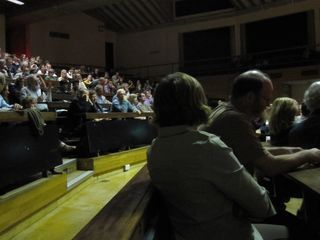
We have just finished hosting our Classical conference in Cambridge -- three days, 400 delegates, so not big in American terms, but big enough for us. Just showing up at a conference is a quite different experience from going to a conference that you're actually helping to organise. When you're part of the home team, it's all a bit of a worry. In particular you're desperate that every paper, every event will be really good. (Lets face it, when you're just an ordinary attender, part of the pleasure is the tut-tutting over a drink about those papers that were truly horrendous ...it's not so when you're responsible for the whole show).
The truth is, I confess, that I was a bit of a minnow in the organisational team, and only really took reponsibility for the two evening "Open Fora" (one on Socrates and one on the Future of Pompeii); all the  same it is was sufficiently anxiety inducing and time-consuming to mean that I hardly got to any of the papers I wanted to hear or to speak to many of my mates.
same it is was sufficiently anxiety inducing and time-consuming to mean that I hardly got to any of the papers I wanted to hear or to speak to many of my mates.
As I've explained before, the idea of these was to open the conference to a wider public than just the signed-up conferees, and to put some interesting non-classicists into bat. Simple idea, so why so time-consuming? Well, on the one hand, all the usual potential disasters that needed averting (one of the participants had to withdraw for utterly cast-iron reasons with two days notice....bless her , Germaine Greer stood in almost no notice at all, but it was an unpleasant Saturday afternoon). But even without that, if you're not practised at it, just getting 4 people to converge on the same place at the same time, feed them, get them jollied up to talk engagingly, and then get them away again, easily becomes a full time job for a few days... believe me!
So what was the verdict?
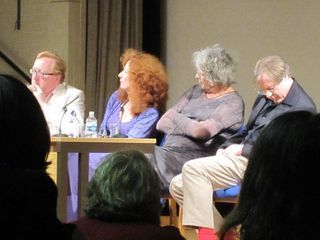
We certainly got a good audience. We weren't actually turning people away at the door, but we did attract some "real people" (and on the Pompeii night, we also had some kids learning Latin with us on a Sutton Trust Summer School, not to mention a smattering of under 10s -- attracted, I guess, by the presence of Caroline Lawrence on the panel).
And did they hit the spot? Well, mostly yes. A few people would have liked a bit more philosophical rigour in Socrates, but that was not what we had intended these sessions to be for. And there were some great moments: Germaine laying into Socrates for the treatment of his wife (and also offering a delicious parody of a Melvyn Bragg style treatment of the great guru). And Roger Scruton got a good laugh at the end when Angie Hobbs asked the panellists if they had changed their minds about Socrates over the course of the discussion: "not about Socrates" he said, "but about Simon Heffer" (referring to a fellow panellist). But my favourite moment came with a question from Barbara Graziosi in the audience. Wasn't the problem about Socrates, she asked, not so much to do with an awkward commitment to freedom of expression, but the fact that he launched the Cynics on the Athenian population: that unpleasant brand of ancient thinkers, who would roll around the agora, naked and masturbating. Paul Cartledge tried to pour a bit of cold water on this, saying that we shouldn't imagine 100s of them, just a couple perhaps in the agora. To which Graziosi, not unreasonably replied, that one or two would have been quite enough (imagine a couple of naked, masturbating philosophers in your city centre).
As we streamed out, one of the American delegates said that such an event would have been unthinkable in the USA: you would never have got that group of panellists together in the same hall.
Last night, a few people would no doubt have liked a bit more hard core archaeology, but we had a great discussion of how we wanted 'our' Pompeii to be, from all kinds of points of view. Andrew Wallace-Hadrill kicked off with the story of how the collapse of one house at Pompeii had led to the resignation of an Italian government minister (to which David Cannadine observed that if we managed to let a whole row fall down it might spell the end of Berlusconi). By and large, to crudify their points considerably, Caroline (who had come complete with her trademark sponge on a stick, and a very elegant repro Roman mirror) and Simon Jenkins were broadly for reconstruction, or even theme park style replication -- whereas David was more into reflecting about why we couldn't just let these ruins become gently more ruined. Simon urged us to think about Stonehenge. What stops us simply reconstructing it? For heavens sake, it's supposed to be a clock -- and what's the good of a clock with no hands?
But again some of the best comments came from the audience, and indeed the younger members of it. Thank you Ewan and Romy (aged 12 and 9) for asking us what the current presentation of Pompeii offered kids (not much) and praising the House of Caecilius. And thanks to the young person at the back who responded to the general enthusiasm, ably stimulated by Caroline, for re-enactors on site (people dressed up as gladiators, Roman barmaids or whatever, engaging with and educating the visitors). He or she (the question was actually put by the student with the mike... and I couldn't quite see) rightly observed that most re-enactors were just rubbish, and you could see their props behind the screens. So why inflict these B-grade actors on us kids?
As Simon Jenkins glossed it: 'the Anne Boleyn in trainers problem".
That said, Caroline did give a great plug to the gladiator event at the Museum of London this weekend. (Notice to the fearful: no gladiators will be killed.)
Finally.. thanks to all my colleagues (academics, computer whizzes, brilliant support staff, graduate helpers etc) for all your hard work for the whole conference... much harder than mine.
July 26, 2011
Museum photographs

We have the "Triennial Conference of the Hellenic and Roman Societies" in town (more on this later). And the opening party was in the Fitzwilliam Museum, with the splendid array of cakes that you see in the picture, and a jolly good get together in the Courtyard restaurant, at which I took a number of snaps of  the assembled classicists.
the assembled classicists. 
But as soon as I wandered into the galleries, where we were allowed to view the art while quaffing our wine (jolly nice), I was firmly told: no photographs in the galleries. Though before the ban I did manage a nice shot of Professor Neer in the  Greek and Roman Room, as you see.
Greek and Roman Room, as you see.
The puzzle to me is: Why no photographs? I can see that Museums don't want to have visitors taking pictures that they then publish for free. But that is easily prevented by the usual "no flash, no tripod" rule. And some say that it is a question of the loans on display ... the lenders have given permission for their property to be shown to the public but not photgraphed by them. If so, why?
And more to the point, why do Museums have such different policies?
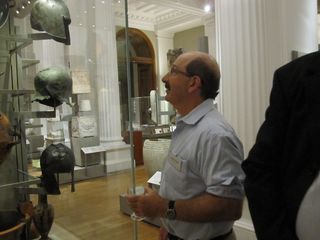
You can take photos of the Elgin/Parthenon marbles in the British Museum, but not in the New Acropolis Museum, where there is strictly no photography, except out of the windows on the top floor. (How about that for an argument for not sending them back?... only joking!)
At Delphi on the other hand,which I recently visited, you can take photos of the objects, but not of your friends in front of the objects. Contrast the Louvre, for example, where half the visitors pose for a family snap in front of the Venus de Milo.
And why do those Museums who still try to enforce the ban keep up the unequal struggle? I mean, when almost anyone's mobile phone can take halfway decent pictures, you cant hope to prevent those sly snaps.
Does anyone want to sign up to my "free photography in Museums' campaign.
(That's Professor Porter admiring the helmets above.)
July 21, 2011
Why bother to visit the Colosseum?
[image error]
OK it's one of the most memorable buildings in Rome -- indeed in Western culture. And the reason I co-wrote a book on it, is that I truly believe that its history from ancient gladiatorial arena to 19th century botanical garden is more fascinating than most people realise. It looks absolutely tremendous from the outside. But is it really worth a couple of hours queuing to see the very battered ruins of the interior?
I'm not so sure.
I have just been in Rome for a few days, doing a recce for a new little tv series on ancient Rome (from the point of view of ordinary Romans, not the emperors and generals etc). I'm not going to give away exactly what we've been seeing -- it will ruin the surprise when you watch (how's that for a tease!). But what has struck me as we have gone round the city of Rome is the mad concentration of tourism.
Everyone wants to see the Colosseum, the Forum and Palatine (all those are on a combined ticket -- which you can buy online: good tip)), the Capitoline museums (on the Campigoglio) and the Vatican.  There are crowds of people, and a dreadful line to get in at almost all times of the day (the later the better is my experience). But go to the wonderful collection of sculpture in the Palazzo Massimo (near the main train station) and you will not have to queue for a minutes, and you will find some of the most stunning works of Roman art to have survived (Livia's Garden Room from Prima Porta is here, for example, and you can't get better than that).
There are crowds of people, and a dreadful line to get in at almost all times of the day (the later the better is my experience). But go to the wonderful collection of sculpture in the Palazzo Massimo (near the main train station) and you will not have to queue for a minutes, and you will find some of the most stunning works of Roman art to have survived (Livia's Garden Room from Prima Porta is here, for example, and you can't get better than that).
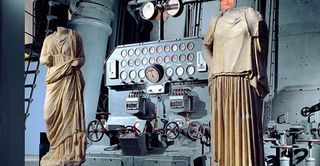
Even fewer people make it to the nearby museum in the Baths of Diocletian (less stunning for art, but some great material on early Rome, a beautiful Michelangelo Cloister -- and some extraordinary ancient terracotta scuptures, the medium everyone tends to forget ).
But the prize for the best least visited museum must go to the Central Montemartini -- which huses some of the overspill from the Capitoline collections in a disused power station down the Via Ostiense past the Pyramid. First of all the juxtaposition of ancient sculpture and industrial machinery is brilliant (like Musée d'Orsay, only better). But it includes some real treasures (the pediment of the Temple of Apollo Sosianus -- a first century BC building which 're-used' a fifth century BC set of 'original' Greek sculptures; or the tremendous statues from the emperors' pleasure gardens in Rome. Stunning, and when we were there, we saw 2 other visitors.
And just outside Rome, there's the port city of Ostia. Now, this is not in truth quite as impressive as Pompeii or Herculaneum in terms of sheer survival (it was abandoned and gradually covered by sand, not taken out by an earthquake). But unlike Pompeii, you have the streets more or less to yourself, and you can get a feeling of what it was like to walk through a densely populated Roman town...with series blocks of flats built in brick (this was a multiple occupancy place unlike Pompeii...).
What could be done to entice people away from the 'big few' sites into these other amazing places? They all come fully recommended by me, but do a bit of googling before you go; the info available on site is not always all it might be. (Amanda Claridge's Archaeological Guide covers the city sites well too -- though doesnt do Ostia).
July 17, 2011
Archaeology and the Big Society and metal detectors
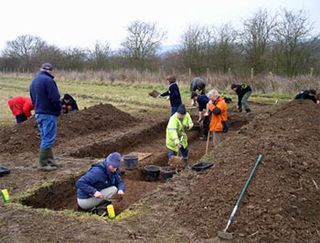
The main Saturday morning news featured the troubles of professional archaeology. There were now, we were told, 7% fewer professional archaeologists than however many months ago and indeed archaeology was "more reliant on volunteers" than it had ever been before.
My guess is that this did not make the nation's heart bleed. I suspect that most people did not realise that there was a "profession" of "professional archaeology" - and many of those that did would not have rated its importance along with teachers and nurses etc. Which is a pity.
The professional archaeological 'units', spread across the country, have done more than most to ensure that the deep past has not been bulldozed. In fact, most of the new understandings of the early history of London has come from the work of the professional team at the Museum of London (and I wonder what is happening to them in the big MOL shake up). And the same goes for other units in loads of ancient towns and regions. They have dashed into the sites in advance of building development, and extracted all kinds of information from them.
The problem for these units is the recession: not only does the government think that archaeology is the kind of icing on the cake that can be cut, but if little development is going on there are fewer sites for the units to rescue.
So far, so good.
But the idea that archaeology is now more reliant than ever before on volunteer labour is only the idea conjured up by a very short memory indeed.
In the early 70s, when I was a sixth-former and then undergraduate, archaeology was almost entirely volunteer. I did all kinds of relatively responsible archaeological tasks aged c17, that would now be done only by trained professionals. Good or bad, I am not sure.
But a few years ago "volunteering" had almost disappeared from archaeology -- as the professionalized university discipline had taken over the old (skilled) amateur pursuit. Go back to the 1930s and 40s and archaeology WAS by definition an amateur activity. And some of the most influential excavations in this country were done by volunteer labour (eg at Maiden Castle).
In some senses, the professionalisation has been a very good thing (for a start it has enabled archaeologists to react quickly to building works etc, and to get in there with 5 days to spare and look at what was about to be destroyed). In another sense it has pushed the amateur to the margins. It is no coincidence that the rise of metal deteting has gone hand in hand with the rise of the professionalisation of the discipline. As there have been "no vacancies" for amateur diggers, those who would have been filling the Sunday cohorts of excavators have taken to private enterprise and to the glamour of the detector.
I am not usually an advocate of the Big Society, but maybe getting the "amateurs" back on board will help, rather than hinder, archaeology.
July 15, 2011
News from Athens
I have been in Greece for a few days, and made the usual 'pilgrimage' to the Acropolis. A few years ago I posted about the Museum and the row that was then raging between Vangelis (Greece's best known musician) and the Museum authorities. They wanted to bulldoze Vangelis's nice house (above) whoch stands between the Museum and the Acropolis itself (and so from the lower floors spoils the vista between the two). Understandably, Vangelis rather fancied staying put.
There was a lot of mud slinging on both sides. Vangelis insisted on the architectural distinction of his house (true from the front, not from the back) and that the design brief for the Museum had made it clear that the house (and its next door neighbour) should be preserved. The opposition said that Vangelis was (ab)using his influence and his international contacts in keeping his own house standing, when the cityscape demanded the reverse. Has it been the house of any old Athenian, it would have been bulldozed long since.
Anyway, Vangelis won. And all the notices that used to cover the front of the house, explaining the case for preservation have gone.
Instead, as you can see in the picture, there is nowa nicely traditional anarchist slogan -- "Eat the Rich" -- plastered on the facade. Whether this is aimed at the super-rich Vangelis or at the super-rich bankers/euro--exploiters or whoever, is not clear.
As for whether Greece is obviously suffering, is constantly in mid-riot and denuded of tourists ... the answer is no. I am sure that Greece IS suffering (and Greek friends tell bad stories of redundancies, strikes, and no money to keep basic services going). But on the main tourist sites, you would not actually know (except the number of guards with whistles peeping at offending tourists who stray where they shouldnt seems strikingly reduced) .. and the usual places were all packed as usual.
Which is either testimony to a very efficient cover up, or to the fact that somehow life does (at least) APPEAR to go on, even when the infra-structure is in mid-collapse.
July 11, 2011
No confidence in David Willetts
We are about to vote in Cambridge -- on a motion of no confidence in David Willetts, the Universities' Minister. I have to say that I was not hugely keen on this motion. It's not that I feel any confidence in so-called 'two brains'. Far from it. But I am not sure that having a vote of the Regent House (that is more or less -- and in some significant senses LESS -- the Cambridge university academics as a democratic parliament) is the right way to go about showing one's lack of confidence.
I know that Oxford have just voted that way. But it does feel a bit like all those student motions I eagerly supported in the 1970s..."This JCR has no confidence in the recent government of Chile", "This JCR reaffirms its support for the people's struggle in South Africa". We meant it all frightfully sincerely, but what good did it do except make us feel more virtuous? And wasn't there a sniff of arrogance in our thinking that OUR no confidence somehow counted.
OK, I realise that Cambridge is much more involved in what Willetts is doing than our JCR was involved in Chile (however naively well meaning our vocal intervention might have been; and it didnt go any further than voices). But I have some sympathy with those who argue that the university's way of engaging with government policy, and showing its opposition, should be to respond critically to the recent white paper... and explain why this represents reactionary, unthought out and damaging higher education policy
But now that the motion of no confidence has come to a vote, despite my qualms, I shall be voting against Willetts -- and urge the rest of my colleagues to do the same.
Why?
Well it's simple. If Willetts "wins" the confidence vote, he will certainly use it -- as a feather in his cap. We will see him crowing on the Today Programme and Newsnight and beyond about his victory at Cambridge, and when anyone queries the support he has among the academic community, he will point to the Cambridge vote.
Now that it has come to a vote (ill-advised as it may be), any vote against no-confidence will be paraded as a vote backing government policy.
So I am afraid that we have to think ourselves back to the JCR and vote against Willetts. Any other way and it's a victory for him
July 8, 2011
Hello Southern Sudan
This is just a brief post. The daughter is in Rumbek in Southern Sudan. She is doing her PhD research and learning Dinka. We all agree that you cant work on a culture without knowing what it speaks, but learning Dinka isnt quite like learning your ordinary sort of languages which (if worst comes to the worst) always have a Teach Yourself Book. So she is there doing a course with the nice missionaries, and then is based round about for 9 months or so. (OK it makes field work in Italy look a bit tame.)
Parents of young anthropologist/historians learn NOT to worry. But there she is miles way even from the capital in Juba (where the celebs and William Hague and the rest will be turning up to all kinds of jollities). But if you want to know what is happening in the real country, and how the celebrations go in Rumbek amid the curfew and electricity outages and all the rest, she will be writing about it here.
The big independence day is this weekend. So good luck to one and all there.
(The picture at the top is the road by the airstrip....at Rumbek itself.)
July 7, 2011
University perks

I am not expecting huge support on this one, but let me try anyway. Give us a hearing.
In the old days (that is until last year), after we had done our examining in the summer, we would (in my Faculty at least) have a dinner.. a nice one, a modest one, but an important one. Like the system or not, examining is a stressful process for examiners as much as students. It was wholly good to get together and share a glass or two, to talk over what we had done and why we had disagreed on the 2.1/1st borderline or whatever. The oldies explained to the young examiners what the process looked like in the fullness of time, and the young examiners (who are usually hell of a lot tougher than the old ones) explained to the oldies why they had lost the plot. In the end it was a good learning process overall (in service training by another name) and it bonded everyone again in a basically positive way. It was cheap at the price -- and certainly no more expensive than the average office party.
This has now been deemed a taxable perk (because the examiners are not the whole Faculty... if the whole Faculty were invited, it would count as an 'office party' and be allowable). And so I have my first taxable perk 'bill'.
I confess I feel pissed off.
OK, I realise that I am lucky to work in what is still a relatively rich university and faculty, and I realise that there are people in the tertiary sector who couldn't even expect a free drink from their employers. But all the same,I feel annoyed to be caught up in what seems to be a fall out of the Parlimentary Expenses row ( a totally risk averse policy, as if the Daily Telegraph was about
Why? Well, as soon as you get rid of the live and let live principle, you lose out on everyone's good will. And it is good will and trust that keeps the system going. And, anyway, overall the management gets fars more from my pocket in the way of added extras, than vice versa. Example?
Well, from time to time I will take a student (graduate student or undergraduate) out to dinner. From time to time that is simply the best educational way of talking about the educational issues that need to be talked about one to one.. you need a couple of hours, a bit of relaxation, a bit of time to chew over issues.
I never resent that. I am happy to plough some of my cash into pizzas or whatever. But I have to say that the tax perk bill does irk on that score. Ok I think, if I pay tax perks on my examiners' dinner, why cant I charge entertaining the graduate student, or charge the undergraduate lunch, against my tax bill. I know that I cant, but I resent the erosion of trust and of that sense of 'quid pro quo' on which I was brought up. (Ok, sure, I get 40 quids worth of dinner once a year but I give that back to the academic community in similar and probably financially more generous ways..)
And the same goes for other things. I get all kinds of memos telling me that I should not use the university post or phone for private mail or calls. Do I ever get a memo asking me to submit a bill for the university calls I make on my home phone? Not bloody likely. I have no doubt that on the profit/loss account, the university owes me, not vice versa. And I never used to mind.
Of course, I dont want to live in a world in which invoices are tossed back and forth between employer and employee. And I dont want to live in a world where I start to resent taking my students out, simply because the university wont take me out to dinner occasionally.
But the transparency culture will in the end have me submit a bigger bill to my university than they submit to me, andhave my (up to this point rather lucky) students lose out.
And this must be going on, to a greater or lesser degree, in hundreds of other institutions.
July 5, 2011
Graduation

Our students graduated this weekend, in their black dresses, gowns and fake ermine.
Overall, I think we do it pretty well in Cambridge. First of all, we do it in late June/early July. The kids take their exams, we mark them, they graduate, and if they are lucky their parents load their stuff up in the car and take them away.
All this within the space of a month. It is hard work (for us as much as for them), but so much better than what happens at many, if not most, other universities in the country, where the students come back in the autumn to graduate. That would seem weird to me...by then you are on with the rest of your life, the last thing you want to do is get up in fancy dress to pick up a degree certificate. But maybe I am not one to judge, as in 1977 I couldnt face any of this hullaballoo and told my parents that noone graduated at the senate house any more..and made my own way home.
Overall the university graduation ceremonies take three days, over a Thursday, Friday and Saturday, and colleges go in chronological order of foundation. This means that Newnham, as a late Victorian foundation, has the best position of all: Saturday morning, followed by a buffet garden party (and these days the sale of college memorabilia.. and I am sure that there must be some Gift Aid forms flying around somewhere!).. and alcohol permitting they can hit the road by mid afternoon.
Depite my youthful dislike of the whole process, I now rather enjoy it -- especially when, as this year, the kids have done well (a first and 4 very nice 2.1s... and they gave me a great bottle of Calvados as a parting gift, having observed me quaffing the stuff in Paris). And I enjoy meeting the Mums and Dads. So far as I can, I make it a rule not to meet them before (somehow it gets in the way of my relationship with the student), but after their offspring have finished, it is great to do -- and occasionally, though not this year, a real surprise!
All in all, an effective (and affective) rite de passage. But this year, even more so for me, because on the very same day as graduation we had a Study Day for next year's first years. It is ten years ago now that we started inviting the upcoming classicists up to Cambridge for a day at the start of summer, to check out their language knowledge, and to give tailored advice about how they good maost effectively work over the few months before they arrive in Cambridge .. from museum visits to getting a lot of reading done. It really helps them hit the ground running. The truth is that after the A level course, even the brightest need quite a lot of advice about how to get down to reading a book of Latin on their own....
This Study Day hasn't coincided with Graduation before, but this year it did... and I coudn't help saying to them, 'In three years that will be you". And I couldnt help thinking that, for me, the time would have passed in the blink of an eyelid; and doesnt time speed up when you get older.
Mary Beard's Blog
- Mary Beard's profile
- 4112 followers



